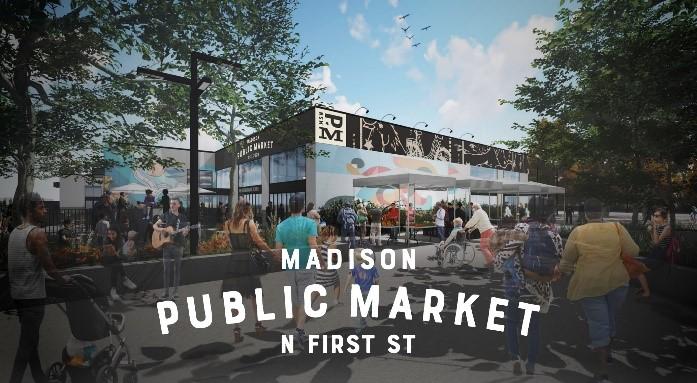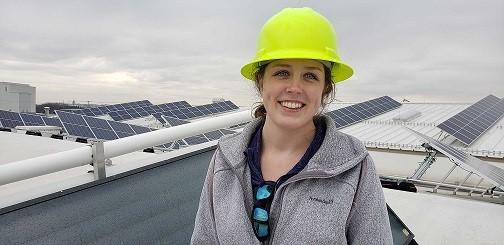
Major Infrastructure Investments in the City of Madison
postedTo date, over 20,000 projects have been awarded funding from the President Joe Biden's Bipartisan Infrastructure Law. They range from repaving roads and water system upgrades funded through formula grants to states to competitive funding for massive bridge and transit projects. Below are a few projects locally impacted by the funding in this law.

John Nolen Drive
John Nolen Drive is the gateway to Madison. Thousands of people use John Nolen Drive to enter downtown every day, witnessing one of the more dramatic view of Madison, the Capitol, and Monona Terrace. With the help of $2 million from the federal Bipartisan Infrastructure Act, the City is rebuilding John Nolen Drive, including its causeways, bridges and bike paths, and making shoreline improvements.
University Avenue


University Avenue is a major arterial roadway for Madison. Over 50,000 people use it per day to travel to/from the west side of Madison to the Downtown. The roadway provides access to the University of Wisconsin Hospital & Clinics, the University of Wisconsin-Madison and many local businesses. With $2 million from the federal Bipartisan Infrastructure Act, the City is reconstructing the roadway installing a new stormwater interceptor pipe, which will reduce flooding and maintain emergency access to the hospital, preparing the groundwork for Bus Rapid Transit. Plus, a new pedestrian and bicycle bridge will provide safe travel for an all ages and abilities route along the roadway.
The Madison Public Market on Madison’s East Side


Set to break ground this spring with $4 million in federal American Rescue Plan Act support, the Madison Public Market will be home to a vibrant, year-round public marketplace where new entrepreneurs and established local business will connect directly with their customers. The Market emphasizes equity through entrepreneurship and is already being embraced as a place in Madison where businesses owned and operated by people of color can get their start.
Dynamic Investments in Madison’s South Side
Under the leadership of Dr. Ruben Anthony, President and CEO of the Urban League, a Black Business Hub is rising on Madison’s south side. Supported by $5 million from the American Rescue Plan Act, the facility will address Madison’s stark disparities in Black business ownership and entrepreneurism by providing space to incubate, accelerate, and network Black and other BIPOC-owned businesses including retail storefronts, small office spaces, co-working and collaboration spaces, an entrepreneurship kitchen, and much more.
Thanks to funding from ARPA, Madison’s south side will be home to the Center for Black Excellence and Culture, which aims to expand economic, social, and cultural opportunities in the community as well as a new headquarters for Centro Hispano allowing them to expand workforce training and programming focusing on our Latinx community.
Federal funds supported Madison’s Diverse Small Businesses
The City of Madison offered Small Business Equity and Recovery Grants funded by the federal government to a diverse array of small business owners. The City gave 348 grants of up to $10,000 totaling $2.2 million. Businesses had to be independently-owned, owned by historically underrepresented people, and have annual revenue less than $750,000.
JPs Hair Design
JPs Hair Design, owned by Jeff “JP” Patterson, is a beloved, long standing barbershop and hair design center that serves mainly communities of color in Madison. In addition to cutting hair, JP’s has partnered with the City-County public health department to educate and vaccinate during the pandemic. JP’ strong community connections and partnerships ensure that the small shop has an outsized impact on the community. In 2020, they received a Small Business Equity and Recovery Grant to help them during the worst of the pandemic. “The Small Business Equity and Recovery Grant allowed JP Hair Design, Inc. to outfit each barber and the establishment with appropriate PPE gear. This gave our clients and staff confidence that we were trying our best to control any spread of the virus in our establishment. The grant also provided cashflow during the hesitation of some clients coming back into the public. We were able to stay out of the red with assistance from the grant, it definitely helped me keep my doors open,” JP said.
Anthology
Anthology is woman-owned paper and craft shop on the iconic State Street in Madison. Owned by two sisters, the store’s mission is to facilitate creativity by selling works by local and independent artists. In 2020, they received they received Small Business Equity and Recovery Grant and other federally funded supports. They are very thankful for the support received and have recovered well. “We are grateful for the ways government and our customers stepped up during 2020, and the random luck of moving into a bigger space in 2018 that positioned us to thrive. Though sales dropped significantly in 2020 we had a true bounce back in 2021 and are on pace to set new records,” Laura Komai said.
Naly’s Floral Shop
Naly’s Floral Shop is a beautiful addition to Madison’s Northside. In 2020 they received they received $3,000 from the Small Business Equity and Recovery Grant for PPE to protect staff and customers. In 2022 the received $19,800 in American Rescue Plan Act funding to help support their growth. They are very thankful for the support they received. “The grant has helped us tremendously! It helped us navigate through the toughest time during the pandemic. We’re so happy that we’re still here to continue to provide our services to spread love and comfort during this time with fresh cut flowers. With gratitude, Tou and Naly”

Engineering Division GreenPower Program

GreenPower Apprentice Brooke Peterson
Brooke Peterson is in her third year with the City of Madison’s GreenPower program which trains young people from diverse background in solar and electric. Trainees work under licensed City electricians to install PV solar, EV chargers, and LED lighting at City buildings. Brooke was excited by this opportunity after seeing the value that her brother gained from a career in the trades. The Green Power program staff spent a lot of time in the past few years working on a variety of projects improving the community that were directly supported by the American Rescue Plan. GreenPower is also planning to install solar for Madison's first Public Market. The Public Market is supported by a $4 million ARPA grant and will begin construction this year. By emphasizing equity through entrepreneurship, the Market is already being embraced as a place where businesses owned and operated by people of color, women, and first-generation immigrants can get their start.
Dear Diary – The Black Girl Experience
With federal ARPA funds, the City of Madison was able to support 900 young people with youth employment and programming opportunities over the last two summers. For instance, an organization called Dear Diary, Inc. set an goal to provide internships for junior and senior Black girls from across the City of Madison with a particular interest in girls who are previously, currently, or at-risk of involvement within the justice system. Each young person was required to complete an application for participation within the program. Once the program began, they spent their first two weeks with Dear Diary staff in training. During this time, they worked collaboratively with staff and guest experts to write resumes, learn their strengths and how to play to them, and interviewing skills. Simultaneously, they created profiles about their career goals and the necessary steps to meet their goals. Each girl within our program was matched with an internship within the community. They were required to work a minimum of 10 hours per week in their paid internship. During this time, youth learned skills and tools necessary for various career fields of their interest. At the end of their internship, a number of the participants were offered jobs from their internship sponsor.
American Rescue Plan Kept Essential Services Running
When COVID-19 hit, Madison Metro reduced its bus service by 35% and offered free fares so that essential workers and residents could continue to access critical destinations such as hospitals, grocery stores and doctor’s offices. Metro used ARPA funding to keep drivers on the payroll and redeploy them to our maintenance unit to deep clean buses on a daily basis. ARPA also allowed Metro Transit to install and provide critical safety equipment, keeping drivers and passengers safe as they traveled. More than 50 drivers a day were in the garage wiping down bus interiors with bleach to provide as safe an environment as possible for their passengers and coworkers. By keeping its workforce intact, Metro was quickly able to quickly increase its service back to more regular levels when the effects of the pandemic started to lessen.
Now Metro is using American Rescue Plan funding to update all aging technology systems to allow its system to operate more safely, efficiently, and passenger-friendly than ever before as Madison gets ready to transition to a more modern, electric and rapid Metro system.
Bipartisan Infrastructure Law Helping Madison Create a Bus Rapid Transit System
They City of Madison has been working to reduce our carbon pollution to improve air quality and public health, lower utility bills for residents and businesses, and create more opportunities for and access to good paying, high quality jobs.
The City has recently undertaken a complete new service design and is working on implementing Bus Rapid Transit (BRT) in the City for the first time. The Bipartisan Infrastructure Law allows Metro to upgrade all of its 46 BRT buses to all-electric vehicles. With each of Metro’s current buses using approximately 5,658 gallons diesel each year, electric buses are expected to conserve nearly a quarter million gallons of fuel yearly as well as save the City up to $125,000 in maintenance costs per vehicle during the lifetime of each bus.
As these projects are brought online, the community can look forward to the rewards of a robust high-quality transportation system that provides better access to jobs, more equal access to opportunity, reduced traffic congestion, and cleaner air to breathe.

ARPA Supports Small Business Chambers
Madison Black Chamber of Commerce and Wisconsin Latino Chamber of Commerce are strong partners of both the City of Madison and the State of Wisconsin. The chambers provide hands-on technical assistance and support to businesses. During the pandemic, they received ARPA funding through state grants. The Latino Chamber used the funds to expand educational programming and culturally competent technical assistance for entrepreneurs, grow its revolving loan fund to give more entrepreneurs access to capital and hire more staff to work in communities across the state. The Black Chamber led seminars on how to apply for PPP and other grants, how to pivot during closures and how to engage their customers in new ways. “This grant will allow us to really get off of our hamster wheel,” Camille Carter of Madison's Black Chamber of Commerce said. “A lot of times, when we have little capacity, we dream little. But now we are excited about dreaming big!”
This content is free for use with credit to City of Madison Engineering.